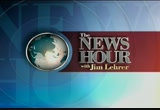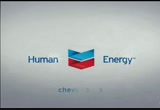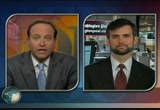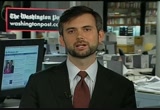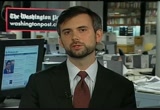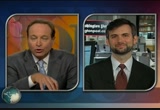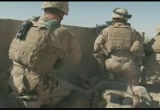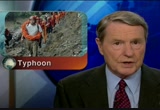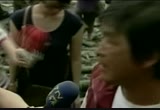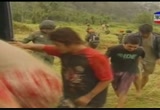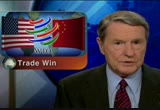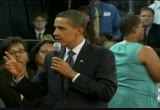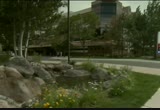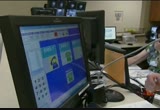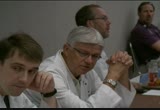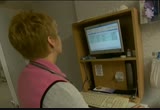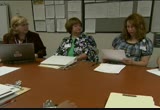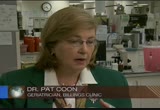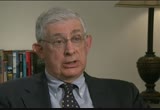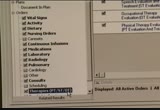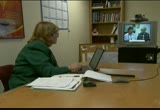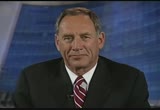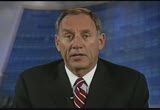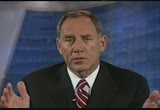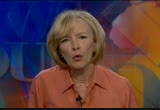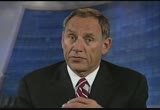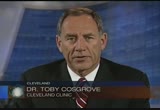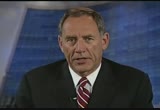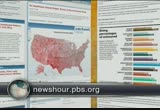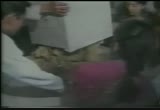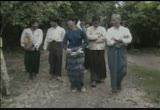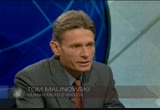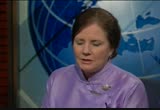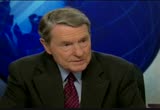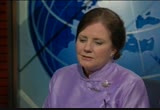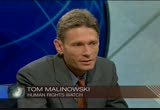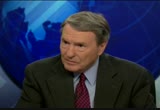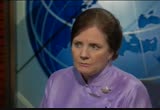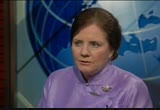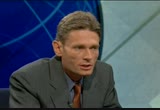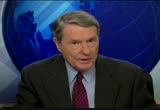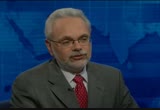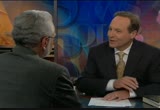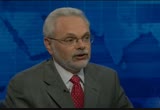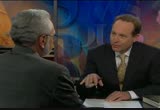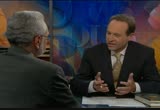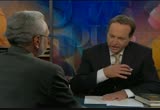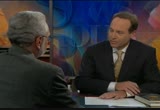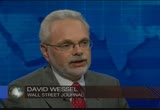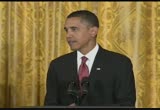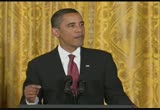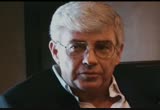tv The News Hour With Jim Lehrer PBS August 12, 2009 6:00pm-7:00pm EDT
6:00 pm
captioning sponsored by macneil/lehrer productions >> lehrer: good evening. i'm jim lehrer. on the newshour this wednesday: the lead story is the general economic outlook after the federal reserve decided not to raise a key interest rate; then, the other news of the day, including a report on the devastating typhoon that hit the island of taiwan; two takes on the team approach to health care; a report from billings, montana; plus a talk with the
6:01 pm
head of the cleveland clinic, as we launch a conversation series about the health care reform debate; and an update on the situation in myanmar as nobel peace laureate ahng san soo chee goes back under house arrest; and a chat with david wessell of the "wall street journal" about his new book on the federal reserve. major funding for the newshour with jim lehrer is provided by: >> tiny little thing, it's just... not big. ah... okay, i found it. ( cheers and applause ) okay. >> we are intel, sponsors of tomorrow. ♪
6:02 pm
>> what the world needs now is energy. the energy to get the economy humming again. the energy to tackle challenges like climate change. what is that energy came from an energy company? everyday, chevron invests $62 million in people, in ideas-- seeking, teaching, building. fueling growth around the world to move us all ahead. this is the power of human energy. chevron. and with the ongoing support of these institutions and foundations. and... this program was made possible by the corporation for public broadcasting. and by contributions to your pbs station from viewers like you. thank you.
6:03 pm
>> lehrer: the federal reserve signaled confidence today in the economy's ability to come back. as expected, the central bank held a benchmark interest rate near zero, a record low. and in a statement, policymakers said: "economic activity is leveling out." they also said financial markets "have improved further" since their last meeting in june. in response: the dow jones industrial average gained 120 points today to close at 9361. the nasdaq rose nearly 29 points to close at 1998. jeffrey brown has more on our lead story. >> brown: and for that i am joined by ""washington post"" business reporter neil irwin. that line jim just quoted, "economic activity leveling out" that's fed-speak for things are looking better. what are they seeing? >> they're seeing the same
6:04 pm
are seeing and ordinary americans are seeing, which is even though the economy is in bad shape, we're not seeing growth yet probably things are better than they were six months ago and we seem to be in a bottoming process where the economy isn't shrinking at the pace it was, it probably isn't shrinking at all. that doesn't mean we're going to get a roaring recovery but it's better than we were. they explain some of the things that seem to be happening. >> brown: they say that economic activity is likely to remain weak for a time, i'm quoting, so there is still plenty of caution. >> there is, and, of course, they're not proclaiming victory, the fed is not saying it's all over, we can go back to the way things were and the economy's in great shape. they're leaving interest rates near zero, as you said, and, of course, they're saying they're going to leave them there for some time and that's the signal that we don't think this is over, we're doing everything we can to try and support the economy and get us out of this
6:05 pm
sometime in the future. >> brown: even more than interest rates, this time, observers were watching to see if the fed would take action on some of those big programs they put in place last fall to help with the economic crisis, and they did take some action. tell us what they did. >> that's right, there was a program announced in march to buy $300 billion of u.s. treasury bonds and that has been kind of controversial -- the idea was to lower interest rates to make it cheaper for companies that wish to expand or cheaper for people trying to buy a house, so the goal was to buy these bonds and thereby lower interest rates. some of the controversy has come about because it feels a lot to people like they're printing money to buy government debt, they're printing money to finance the budget deficit, so it became a very controversial program given that autosmaller than some of the other initiatives the fed has undertaken, what they said today is that program is going to go away, they're going to do the 300 billion they announced but not extend or expand the program past october. one program has been taken out of the arsenal for the federal reservet now.
6:06 pm
>> brown: at the same time others continue, there was some conjecture they might signal something about the so-called talf, the term asset-backed loan facility which helps with consumer loans so they're in a balancing stage of figuring out where to take action and where to hold back. >> that's right, they have a tightrope to walk fthey move too quickly, take away these programs too fast, it could cause the recession to worsen and maybe we don't have the recovery we want. that's the mistake the japanese made in the 1990's. on the other hand if they wait too long and don't remove these programs quickly enough we could have inflation down the road. that's what they're going to be spending time thinking about in the years ahead as they try to deal with the aftermath of the expensive programs they created the last year. >> brown: you mentioned inflation. i note in the statement it says, "predicts inflation will remain under control for some time" so they're looking out there and they're not seeing it right now, at least. >> that's right, the
6:07 pm
unemployment rate is 9.4%, our factories aren't operating anywhere near capacity, all of that makes it hard in the view of the fed leaders for prices really to rise at a dangerous rate, and that's their view. they'll be monitoring it closely, but the view is that the real risk is that the recession continues and gets worse and we don't have much of a recovery. that is the predominant concern, not that there will be inflation in the near tefrment >> brown: lastly, let me go back to intest rates. it's the thing we usually talk about at fed meetings, now it stays where it is and it's the last thing we talk about. what did they signal today about how long they will keep rates this low? >> it's clear they want to keep rates low for some time. what "some time" means is going to depend on the economy. if we end up in an environment where growth resumes and gets strong next year, maybe by the end of the year they could be raising rates, if this becomes a long slog it could be longer than that. i think if you gave ben bernanke truth serum he wouldn't be able to tell you now when they'll be raising rates again.
6:08 pm
>> neil irwin of "the washington post." >> lehrer: we'll have more on the federal reserve later in the program tonight. in other news today: 400 u.s. marines, backed up by afghan soldiers, launched a new offensive in southern afghanistan. they stormed a taliban town in helmand province in a helicopter air drop before dawn. the u.s. and afghan troops traded heavy fire with insurgents in an all-day battle. commanders said the goal was to secure a critical district before next week's presidential election. >> dahaneh is one of the key towns in the area. all the smaller towns are economically dependent on dahaneh. for example, this is where the bazaar is. by liberating dahaneh, we free the local populace from the influence of the taliban. they are able to go about their daily lives without being faced with intimidation or murder. by nightfall, taliban fighters still held the town, and the
6:09 pm
fighting intensified. marine officers said the combat could last several days. in the philippines, overnment troops attacked militants tied to al qaeda, and killed at least 20 of them. the assaults on a southern island, hit jungle camps used by leaders of the group abu sayef. it was unclear if any of the top militants were killed, but the military said fierce fighting lasted all day. heavy rain in southern taiwan held up the search today for survivors of a powerful typhoon. hundreds of people may be missing, and hundreds more are still waiting for help, four days after the deadly storm. we have a report narrated by jane deeth of independent television news. >> reporter: reaching people cut off by the typhoon is difficult and dangerous. this rescuer will have to be rescued.
6:10 pm
off camera, the ropes the rescuer was hanging from snapped. luckily, he was stopped from being washed away. you can see why getting to survivors is taking time. in shiao lin, which was flattened by the flood, people are being brought out alive, but it's a slow and risky operation. this man, winched to safety, said many others were buried under the mud. >> the flood just came in. nobody can escape. >> reporter: taiwan's national fire agency has said 100 people might be dead in shiao lin. the mudslide left just two houses standing. but around 200 people were found alive this morning. everyone had feared they were dead. survivors are being flown to this school which has been turned into a rescue center. the president came today and said he's doing everything he can, but some people are angry, saying the help has come through
6:11 pm
days too late. >> the rescue team should have started on the first day. 72 hours have already passed. how can they do this? >> reporter: the president will decide tomorrow whether to increase taiwan's disaster budget to cope with these flood, the worst in half a century. local officials say they need water pumps and generators -- and help clearing the major roads. in the towns, people have begun to think about trying to stop disease spreading. but in the remote areas, where people scrambled up the hills to escape the mudslides, leaving everything behind, the priority is just to get food to the survivors. >> lehrer: the official death >> lehrer: the official death toll in taiwan stood at 63. the typhoon killed at least eight more people on mainland china. secretary of state clinton spent this day in nigeria, urging political reforms in the oil-rich country. it was the fifth stop on a seven nation african tour. clinton called for nigerian leaders to reduce corruption and
6:12 pm
promote democratic practices ahead of elections in 2011. in recent months, violence in nigeria's oil region has repeatedly disrupted output. the u.s. won a crucial international trade case against china today. it could give american music, books and movies much greater access to chinese markets. the world trade organization found beijing had illegally barred attempts to market those products directly to chinese customers. china could still appeal the ruling. the u.s. federal deficit now tops $1.25 trillion, with two months left in the fiscal year. the treasury department reported the figures today. the obama administration expects the deficit to exceed $1.8 trillion when the fiscal year is over. that's more than four times larger than last year's record.
6:13 pm
and still to come on the newshour tonight: a myanmar update; and the fed and the financial crisis. that follows a report on one of the key issues in health reform, lowering costs and improving care. our health correspondent betty ann bowser reports on how one system is doing just that. the health unit is a partnership with the robert wood johnson foundation. >> there are examples of how we can make the entire health care system more efficient. >> reporter: when president obama talks about his idea of great health care, he usually singles out a few choice models. >> what worked? the mayo clinic, the cleveland clinic, gessinger, kaiser permanente. there are health systems around the country that actually have
6:14 pm
costs that are as much as 20 or 30% lower than the national average and have higher quality. what is it that they're doing differently than other systems? >> reporter: what they're doing is providing excellent care at a low cost through an integrated system where doctor visits, tests, surgeries, hospital care -- the works -- are all done under one roof, but the mayo and cleveland clinics aren't the only integrated health care system getting good outcomes. in a place you might least expect to find it, here in south central montana, the billings clinic is getting similar results. >> at the core of who we are is this multispecialty group practice where all the physicians are really working together for the care of the patient. >> reporter: dr. mark rummings is billing physician in chief. >> we have 240 physicians who believe in this model and we can be successful by showing that we can deliver high quality, safe
6:15 pm
patient care and have better outcomings by doing it this way. >> reporter: across the country, most doctors are independent private contractors who get paid a fee for every service they perform. but at billings, like the mayo and cleveland clinics, doctors are employees, on salary. that includes high-end specialists like oncologist, cardiologists and radiologists. since they all work together in the same system, for patients, it's a kind of one-stop shopping. >> we have a lady we're bringing up to labor and delivery. >> reporter: with 3,500 employees, the billings clinic is montana's largest multispecialty group practice, with a dozen primary and specialty care clinics in the region. dr. georgia nieve is an oncologist at billings. >> care is patient centered.
6:16 pm
patients get brought here and we try to arrange for them to see everybody they need to see in a very rapid period of time. it's a collaborative model. it's a model where i can always call up the doctor down the hall or walk across the hall and get him to see somebody the same day if they need to be seen that day for a serious illness or diagnosis. >> nieve and his colleagues routinely talk to each other about how best to treat patients. >> can he have additional radiation therapy after excision of the lesion if there is any suspicion of margins in that area there, chris? >> i guess i wouldn't recommend anything beyond what he's already had. >> rod suggested trying chemo, again, but i don't think that's going to fly with him. >> reporter: and avoid repeating expensive tests which often are unnecessary. >> hi there. >> reporter: while nationwide, medicare spends an average of $8,304 a year on each patient, in billings, montana that number
6:17 pm
is $6,332, among the lowest in the country. the billings clinic is one of 10 physician group practices nationwide taking part in a medicare demonstration project. it's designed to see if better coordinated care for chronically ill patients can save the government money and improve patient outcomes. >> hi, pearl. >> reporter: two years into the project, the answer was yes, the cost savings at billings came from 500 congestive heart-failure patients monitored in a disease-management program. dr. doug carr is the medical director of billings and headed the study. >> we were able to reduce hospitalizations for them, over the long haul, over 40%. that's about 500,000 or half a million per year but we were able to save 1-1.5 million in avoided hospitalizations. >> reporter: hospitalizations are the single most expensive
6:18 pm
item on america's health care tab. >> there is my girl. >> reporter: staying out of the hospital is exactly what she wants to do. >> al has gone to the hospital approximately once a week. >> reporter: that was before she enrolled in the billings program of all-inclusive care for the elderly, or pace. for an annual fee paid by medicare or medicaid, all health care services are coordinated by a team of medical and social service providers. >> and she wants to just check another thyroid level. >> reporter: pace also provides its members with transportation to doctors appointments and a day center. with consistent access to care, frees and the other pace members are able to continue living on their own instead of ending up in a nursing home which is much more expensive, but when billings officials talk about the key to keeping medical costs down, the one thing they always point to is the way they pay
6:19 pm
their doctors. >> physicians are paid a competitive salary, but it is not based on whether they see patients -- medicare patients, medicaid patients, commercial patients, whatever, and they're not paid -- they're paid for doing things for patients, and they're not paid for tests that they order or where they do their surgeries. >> reporter: dr. pat koon is a geriatric specialist at billings. >> i get no reimbursement based on how many tests or laboratory tests that i order, what i'm looking at is what is the best way to manage the patient and what do i do to do that. >> reporter: while many doctors argue that tests protect them from lawsuits, there are also financial reasons to order more tests because many of them own interests in imaging centers and when they send patients there for an expensive cat scan or m.r.i., they ke more money,
6:20 pm
but there is no incentive to do that at the billings clinic. doctors paid under fee-for-service arrangements usually make more money than physicians in integrated health care systems, and university of maryland medical school professor and cardiologist dr. john kastor thinks convincing those doctors to join systems like billings will be a hard sell under any health care reform plan. >> this means that the doctors are going to have to give up their private practices and become salaried employees of the hospitals where they work, and doctors are an independent l, and many are imbued with the american tradition of working as hard as you can and being very well rewarded for it -- you're fighting that very fundamental part of our culture. >> reporter: but dr. elliott fisher, director of the center for health policy research at the dartmouth institute thinks
6:21 pm
it's not a question of how much doctors are paid. >> we don't need to pay physicians less at all, we need to pay them differently, we need to give them rewards for improving the overall quality and lowering the costs of care and paying them more when they lower the cost of care. a lot of costs are in unnecessary hospital stays, patients could be cared for at home. there are ways of reducing the costs that would give us a little bit of money to reward the physicians for doing better and actually perhaps preserve or improve their incomes. >> reporter: other cost-savings features of the billings clinic include an electronic records system. that gives doctors quick access to patients' histories and treatments clinic-wide. and billings doctors are able to treat thousands of patients in remote areas of the state and in the neighboring western dakotas, wyoming and idaho through an integrated telemedicine program. >> i wanted to do a follow-up
6:22 pm
visit with you to see how things are going. >> reporter: here dr. coon is able to examine a woman 300 miles away in scobie, montana. there is just one family doctor there for several hundred miles. >> you measure your blood sugars at home? >> yes, i take them every day. >> reporter: many like 80-year-old fitz are unable to drive the hundreds of miles to billings to see a specialist. >> just would provide better care for her than coming here one time and getting lost in care transitions going back to the community. >> reporter: in the past year, billings has conducted about 3,000 telemedicine encounters, which it estimates has saved patients over a million dollars in out-of-pocket expenses. >> i'm going to take your vital signs. >> reporter: while health-policy experts are divided over whether the principles of integrated health systems could be provided in communities cras the country, most agree on one thing. if more doctors collaborated, overall care could improve and
6:23 pm
most important, could save money. >> lehrer: and now the first in a series of conversations about health reform. we'll be getting the views of some leading players and thinkers about what kind of changes they would like to see in the health care system. we begin by picking up on some of the ideas raised in betty ann's story about costs and care. judy woodruff has our conversation. >> woodruff: and for that we turn to dr. toby cosgrove, the c.e.o. of the cleveland clinic. the president visited the center last month as part of his health reform efforts. dr. cosgrove, thank you very much for talking with us. >> it's a pleasure to be here, thank you. >> woodruff: we just heard at the end of that piece by betty ann bowser, in essen an agreement that if you have more collaboration at these clinics including yours, overall quality would improve, costs would go down. you agree with that?
6:24 pm
>> i absolutely agree with that, and what we really have got to put into the health care discussion is how we drive quality and how we bring the total bill for health care down, and one of the very important ways to do that is to integrate the health care system and make it more efficient, and that means integrating not only the doctor with the hospital, which you saw a great example of here, but also integrating hospitals, so not all hospitals are expected to be all things to all people, but rather, to serve the community in a way that the community needs to be served and then have the high specialty things located in places where you can get maximum practice and maximum efficiency. >> woodruff: do you think it's realistic to expand the model to the entire country? to take what billings, montana is doing, to take what the cleveland clinic is doing and expand it to over 300 million people? >> i think it's perfectly possible to expand it. it's not going to happen instantly. one of the things we're seeing is we're seeing an increasing number of doctors wanting to be
6:25 pm
in multispecialty practices, and in big group practices. very few physicians, in fact, in fact only 10% of people who are less than 40 are going in to practice by themselves or with one other individual. they're being driven in that direction by the difficulty in setting up and running a practice, the expectation about about the economics of running a practice, and by the fact that the knowledge has expanded hugely, and it's very difficult for one individual to surround an entire field by themselves, and so they want to have colleagues. and finally, they're being driven there because doctors are not so interested any more in being on call 24 hours a day, seven days a week. they want to have some sort of personal balance in their lives. >> woodruff: so you think this worry is overblown that doctors are still more interested in
6:26 pm
their independence and in keeping their pay scale high? >> i think that we now pay physicians well, but they're not -- they do not have an incentive just to drive volume, and they get paid for a year's salary, they get paid in conjunction with what a specialty would be paid on an average across the country, but they don't have the obligation to drive more volume or do more tests. i think that is the difference. >> woodruff: i've seen you quoted recently that you're worried that there is not enough focus in this health care reform debate over keeping costs down -- reducing costs. what do you mean by that? >> the discussion has moved, essentially, from improving quality and improving access and decreasing costs, to one that is really about insurance reform and increasing access, and if we add 40 million more people to the health care system in the
6:27 pm
united states, you're going to see costs go up, and we need to take costs out of the system by decreasing the total cost of providing care, by integrating, and secondly by reducing the disease burden in the united states, and by that i mean right now we have an epidemic going on around obesity, we have a lot of people smoking. obesity, now, accounts for 10% of the health care costs in the united states, and $147 billion, and smoking accounts for $100 billion. we could provide a lot of health care if we didn't have those two big problems. >> woodruff: what is essential, as far as you're concerned, in any health care reform proposal that is passed into law? >> well, i think what we need to do -- clearly we need to have access for everybody -- i don't think disagrees with that. we want to have people covered for their health care, and then, i think we need to put the
6:28 pm
impetus and the incentives in place so we begin to develop the sort of health care system that you have heard described and put the right incentives to doctors to not order too much or not practice defensively, and so that we get the efficiencies of health care system to its best of our ability. >> woodruff: and what worries you the most about what you are hearing in all of this debate that's under way right now? >> well, the thing that worries me is those two things have been left out. we haven't talked enough about how we're going to drive to the health care system that is efficient, and we have not talked enough about how we're going to deal with this large portion of the health care bill that is result from behavior of patients -- in other words, inactivity, smoking and obesity. >> woodruff: the president came to see the cleveland clinic a few weeks ago. >> yes, he d. >> woodruff: are you still talking to folks in the administration about what they're doing, what they're
6:29 pm
focusing on? >> we haven't had a lot of discussion. we have had some follow-up discussions with them and we have had some follow-up discussions with members of congress to try and bring attention to those two issues that i'm concerned about. >> woodruff: and what do you make, dr. cosgrove, of these rallies that are -- these protests that are appearing -- cropping up at the town meetings that members of congress are having around the country? >> well, i think everybody is concerned about change, and i think with change brings anxiety. i think some of that you see coming out. i think we have to change as a country, though, i don't think there is any question about that and we have to be sensitive so that people's -- people are incented to head in the right direction and it is a fair dispursement of -- dispersement of medical care. >> woodruff: at this point you
6:30 pm
are fegow about how this is going to turn out? >> as i said, i think we're going to see a bill. i don't really know what will be in the bill. i hope we will have an emphasis on efficiency for delivery and on reducing the disease burden in the united states. >> woodruff: dr. toby cosgrove, the cleveland clinic, thank you very much. >> my pleasure. thank you for having me. >> lehrer: on our patchwork nation blog, read a post about why the number of uninsured people in america is growing, and see which communities have been most affected with our county-by-county map. you can go to newshour.pbs.org. next tonight: the continuing crackdown in myanmar, the country formally known as burma. newshour correspondent tom bearden narrates our setup report. >> reporter: aung san suu kyi awoke today in the home that has been her prison for much of the last 20 years. the democracy activist and nobel
6:31 pm
laureate was convicted yesterday for violating the terms of her home detention. the repressive military regime in myanmar has kept her confined for her political activities. yesterday's decision stems from a bizarre incident in may, involving an american man who swam across a lake to suu kyi's home. john yettaw claimed he was trying to save her from assassination. he stayed at her home for two days. both were arrested and jailed on various charges yesterday, suu kyi was sentenced to three years at hard labor. but the sentence was quickly reduced by the junta's leader to 18 months of home confinement. yettaw was sentence to seven years of hard labor. both verdicts will be appealed, but suu kyi's attorney said it came as no surprise. he spoke yesterday to the associated press by phone. >> ( translated ): lady suu has been expecting this outcome from the beginning. we didn't say it before because it would have amounted to trying to influence the court. actually, we anticipated this kind of outcome from the
6:32 pm
beginning. that's why we have been stocking many books and medicines for suu kyi. >> reporter: international condemnation was swift. secretary of state hillary clinton yesterday: >> she should not have been tried and she should not have been convicted. we continue to call for her release. >> reporter: suu kyi will be detained at least through elections planned in myanmar for next year. it would be the first such poll since 1990, when suu kyi's party was elected in a landslide, but was prevented from taking power. >> it's clear that the regime wants to silence aung san suu kyi and all voices of dissent in burma ahead of their sham elections that are planned for next year. elections we know that are nothing to do with democracy and freedom but everything to do with ensuring their continued rule and about entrenching military dictatorship in burma. >> reporter: the power of the regime was challenged two years ago during widespread uprisings led in part by buddhist monks. the protests were brutally suppressed by the military. last year, a massive typhoon swept across the country, killing as many as 200,000 burmese.
6:33 pm
in the face of the disaster, the government's reaction was to deny the scope of the tragedy and refuse international offers of assistance the military junta has been in control for nearly 50 year. it took power in a 1962 coup. it has repeatedly rebuffed international efforts that it libaeralize myanmar, once known as burma. trade sanctions have been effectively diminished by regional trading partners including china. and efforts at the united nations to formally condemn the conviction yesterday were stalled by both russia and china, which said the case of aung san suu kyi was an internal, burmese matter. >> lehrer: for more we go to two myanmar watchers: priscilla clapp was chief of the u.s. mission there from 1999 to 2002; tom malinowski is washington advocacy director for human rights watch. miss clapp, what do you make of the 18-month house-arrest sentence? did you expect more? or were you relieved?
6:34 pm
>> both. yes. she did -- her sentence was three years at hard labor, and i expected three to five years -- >> lehrer: you expected they would put her in prison? >> i expected that's what they would sentence her to. i was hoping that they wouldn't put her in prison, because i think it would be very dangerous for her, so in a sense, i am relieved that they've let her go home, but that doesn't mean that i think the conviction was correct. >> lehrer: what's your analysis of why they did not put her in prison, mr. malinowski? why did they let her stay at home? >> actually, i think this is what they planned to do all along. the backdrop to this is the military junta's plan to hold this so-called election in 2010 in which they're planning to hand-pick a bunch of civilians to form a sort of facade civilian government that would be subservient to the military, ultimately, and they needed to get aung san suu kyi -- the beloved leader of the democratic opposition in burma -- out of
6:35 pm
the way until that election so that she can't interfere with those plans so what they needed to do -- it didn't matter from their view whether she was in prison or confined in her house, they needed to keep her away from the people of burma and away from a position where she could oppose that plan. >> lehrer: there is no question they won't allow her to participate in those elections, right? >> i think there is no question. the new constitution actually would have made it possible if her to participate from detention at home if she hadn't been sentenced by the court, but now that she's sentenced by the court and serving her sentence even though she's at home, she is not eligible to run. >> lehrer: what is known, if anything, about what her life is like inside that house on that lake? >> it's solitary, by definition. >> lehrer: anybody in the house with her? >> she's had a couple of supporters who have been allowed to live with her, who have been sort of misidentified as servants over the last few years
6:36 pm
and they were also sentenced to continued house arrest under the same strange trial, but in terms of outside visitors, very occasional visits by her doctor, by her lawyer, but essentially, a life of terrible, terrible isolation. her family, for example, has been kept from seeing her for many, many years. >> lehrer: what's the information flow about her? and not only just her, about what's going on in the country itself. has that improved any since -- particularly, since the demonstrations and the protests and the arrests a while ago? >> it's improving all the time because of technology -- it's improved a lot since i was there 10 years ago, since i was there -- the people have access to the internet. they have access to telephones. that they just didn't have before. the advances in cell phone technology, the advances in internet technology are beyond the ability of the regime to
6:37 pm
control it thoroughly, so a lot of people have access to those -- to means of communicating with the outside world. >> lehrer: beyond suu kyi's situation, what's it like to live in burma now? what's everyday life like? >> everyday life is very difficult, because it is an extremely poor place. they don't have anything like the services that we're used to in our life. you have to do everything for yourself. it's a bureaucratic battle to get it done. it's a very difficult place to live as an ordinary citizen. >> lehrer: but the word oppressive is used. tom beardon used it in the setup piece. how do we know? >> to us it would be extremely oppressive but to the burmese who have always lived this way, they're used to it, for example, this is is what aung san suu kyi was accused of, you are not
6:38 pm
allowed to have anyone stay in your house that is not registered to live in that house or you can be sent to jail for five years and they do bed checks tonight, the local wardens come around -- >> lehrer: everybody in the country is subject to a bed check? >> yes. but particularly in the cities, and particularly in rangoon where they're nervous about activity. they don't want people getting together and plotting. >> they're used to this, but they're not really used to it in the sense that it's not natural for any human being, and that's why you have -- the pattern in burma has been a couple years of political quiet followed by outbreaks of resistance because people just don't want to live this way, and that's inevitable. it's going to continue until there is a way found to bring these two sides together. >> lehrer: what happened -- the so-called saffron rebellion? the buddhist monks. what happened to them? >> the leaders of the uprising,
6:39 pm
many of whom were buddhist monks, also a number of young activists were rounded up, brutally interrogated and most of them have been sentenced to many years, in some cases decades in prison, served in isolated prisons in the jungle, so we're all focused on aung san suu kyi because she's the hero and the leader of this movement but there has been a massive crackdown on any kind of dissent, and people who are not famous get much harsher treatment than aung san suu kyi. >> lehrer: are there still monks active within the population? >> absolutely. >> lehrer: what are they doing? what are their activities? >> they are laying low right now. they are communicating with each other. they're communicating with the outside world. but as of now, we see there are not massive demonstrations in burma or strikes or actions. >> lehrer: is there any way to estimate, to pick up on your earlier point, is there any way to know or estimate how many people are actually in prison
6:40 pm
for these kinds of dissident activities? >> sure. there are networks that report on this, in a very professional way. >> lehrer: what do you think? >> over 2,000. >> lehrer: over 2,000. does that jibe with what you have heard? >> essentially, they doubled the number of political prisoners after the saffron revolution. >> lehrer: and what's the word on how the prisoners are treated? >> they're treated very badly. >> lehrer: like what? what does that mean? >> it varies from prison to prison. some prisons are worse than others and they move them around to different parts of the country so it's difficult for their families to visit them, they don't feed them well, most prisoners rely on their families to feed them, they don't give them proper medical treatment, they subject them to interrogations and harsh tortures, and they just make life miserable for them, particularly the political prisoners. >> lehrer: here again, referring to what tom said in the setup piece, and you mentioned also about the electronic activity -- the ability to get word out.
6:41 pm
is there any evidence at all that what happens outside burma, whether it's done by the united states, the united nations or any group of nations makes any difference at all? >> it makes a difference in the long run, but it's very difficult to measure. it keeps extreme pressure on the regime, and the regime has to worry about its own population, but people care. the people inside burma care. the regime tries -- >> lehrer: they want to know that people outside are on their side and doing something? >> yes, it means a lot to them. >> lehrer: what's your -- >> i think it means a lot to the people, i think it means a lot to the government too. there is one interesting thing about this verdict that people haven't commented onment we expected it to come a lot sooner. a month ago. even before then. they waited until mid-august when virtually every senior official in europe and the united states is on vacation, and i don't think that's
6:42 pm
entirely coincidental. i think -- >> lehrer: slip it under the radar? >> slip it under the radar, and also, the somewhat more lenient-than-expected nature of the sentence -- in other words, some people expected hard labor in prison, but it's only house arrest. they do have an eye on the international communitiment they are aware that they're living in a world that is watching them and they're somewhat paranoid about what the international community might do down the road, and that is a fear that condition exploited if there is an energetic effort by the united states, by other countries, to continue this pressure and also to enhance it in creative ways. >> every year they prepare for the u.n. general assembly which starts in early september trying to make a few gestures here and there so the international leaders will be a little easier on them. >> lehrer: that's basically china and russia, right, in terms of keeping the rest of the world on the backs of the -- >> the general assembly is when all of the world leaders -- >> lehrer: they all come, right. >> if something bad is going on
6:43 pm
in burma -- in myanmar, the world leaders start talking about it, and the generals do not like that, so they try to make sure that things are calmed down by the time the general assembly comes, and i think that is what they had in mind when they handed out this sentence. >> lehrer: thank you very much. >> thank you. >> lehrer: and finally tonight, the power of the fed at the height of the financial crisis.o once again to jeffrey brown. a note: this conversation was recorded before today's developments. >> brown: even amid some recent positive economic signs, the fallout from the meltdown continues and the lasting impact on individuals, communities and institutions is still being assessed. a new book "ben bernanke's war on the panic" goes wnd behind the scenes to look at why.
6:44 pm
author david wessell is economics editor for "wall street journal." welcome back. >> good to be here. >> brown: you have covered this every day, the daily news we're both part of. when you step back from all those little pieces and look at the big picture, what struck you most? >> i think two things strike me. one is just how enormous the threat was to the financial system and the whole economy. when you write about this one company, one day of the market at a time, it's hard to realize just how big a threat it was, and when i talked to bernanke a few weeks after the lehman brothers thing and he said to me, "we came very close to depression 2.0," it sort of took my breath away. and the second thing is that -- >> brown: that will take your breath away. >> yeah, and it wasn't clear we had avoided it. the other thing is that these people seem larger than life on tv and in the papers, they're smart people but they're ordinary people and the number of decisions they had to make
6:45 pm
under fire with no owner's manual, with very little precedent to go on -- i mean, it was exhausting and it's kind of amazing how much we depended on a very small group of people to basically save us from that economic calamity. >> brown: one of the key moments that you write about, of course, is lehman brothers. >> right. >> brown: the decision-making there about what to do about it, and that's a perfect moment to talk about some of these things you just talked about. you have key players -- ben bernanke, henry paulson, tim geithner. personalities come into play. a sense of -- not certainty about exactly what to do. >> that's absolutely right, so during that lehman weekend in september 2008, bernanke, who is the economist, economic historian from princeton who has very little experience in the markets and very little experience in government stays behind in washington. tim geithner, president of the federal reserve bank in new york, an accomplished behind-the-scenes technocrat who has lived through a lot of
6:46 pm
crises before and kind of has maybe a bit of hubris or arrogance in that he's never fixed a crisis he couldn't fix, fix today's problem and worry about tomorrow's tomorrow -- and then you have hank paulson, this former dartmouth football player which comes up in every profile of him because he feels like a football player, very restless, done 100 deals on wall street, very patient, very 2k3wru6, gives orders, expects people -- very gruff, gives people orders and expects them to comply, sees himself as the superior of all the c.e.o.'s, they come to this weekend hoping to sell lehman brothers to a british bank like they had sold bear stearns to j.p. morgan/chase earlier, they don't have a plan b and the rest is history. >> brown: there is that sense of -- it's an interesting mix of making it up as you go but based on some experience. >> no, this is all new. >> well, i think in a way the
6:47 pm
most eventing event is bernanke since the man spends his entire previous adult life studying the mistakes the fed made in causing the great depression. once he figures out that this is like that again, he looks at the whole world through that lens. some people think he's overreacting or just sticking to the paradigm he knows, but it becomes clear that it is the right paradigm, it is the right metaphor, and because he saw how serious it was when financial institutions collapsed during the depression, the collapse of lehman was quite painful to him. >> brown: it's also interesting that you wrote about the fact that he didn't catch on right away, right? he was part of the fed -- alan greenspan's fed, in spite of all this experience, ben bernanke sounds like was slow to catch on, slow to understand the magnitude of the potential problem. >> i think that's right. i think both ben bernanke at the fed and hank paulson at the treasury used the word "contain" a lot in 2007, by which they
6:48 pm
meant they thoughtg was a problem but they thought the damage would be contained to housing and somehow other parts of the economy would do well, after all oil prices were rising suggesting there was demand for oil so there was growth somewhere and they didn't understand how much the house-price problem had infected the entire financial system. it really isn't until late 2007, early 2008 when they realized the whole world economy is infected, it's not contained at all to housing. >> brown: the other person, looking back salan greenspan, lionized for much of his term and yet you look back and it looks like he, and he has said some of this was kind of controlled by a mindset that in the end didn't apply to what was happening. >> that's right, i think alan greenspan probably got too much credit for the good times and too much blame for what followed but there is no doubt that when you make the list of all the people and institutions who let us down, he has to be on the list, and you make a good point. i think one of the things that greenspan believed, and he has
6:49 pm
said it, is that if you have a lot of rich, sophisticated investors playing poker that they will do a better job of policing the poker table than any regulator ever could because they have so much money at stake. >> brown: that was his thinking. >> that was his thinking. it was wrong, and he's admitted as much. he testified before henry waxman and said "my world view was wrong. he influenced the entire washington community to think that we should leave the markets alone because regulation usually doesn't do any good. >> brown: so in the end when ben bernanke acted, the fed has taken on this huge new role, what has been a mostly secret, even mysterious institution for so many people now is a bigger player, he's taken a much more public role -- you know about the event he did with us recently and other news organizations. you refer to the fed now as even a fourth branch of government. >> right. i think that it exposed itself
6:50 pm
as almost a fourth branch of governmentdrng this crisis. no one else had the power or the money to act to save us from calamity except the fed. the president had more authority to launch a nuclear missile to defend the country than he did to spend billions of dollars to defend the banking system, so the only institution in our government that had the ability to do this was the fed and they came in with all guns blazing. >> brown: but that leads us to where we are now, which is a debate over this unelected -- >> right. >> brown: this unelected officer, this unelected agency with so much power in a democratic society. >> it's caused concern. there was a gallup poll that found fewer people think the fed is doing a good job than think the i.r.s. is doing a good job. part of people's suspicions of concentrations of political power, it's why alexander hamilton's first bank of the united states, a forerunner of the fed, was blown up and the second bank of the united states was blown up as well. i think people are a little
6:51 pm
alarmed that the fed exposed itself as having so much power and they fear that the fed has bailed out wall street at the expense of main street and the reason bernanke went on tv is he's trying to make the opposite case. he's trying to say, "i had to save wall street because it was the only way to protect main street." >> brown: let me ask you before you go, when you write this book, do you now sitting here today feel more sanguine about our ability to prevent something like this in the future? >> i think we've learned some lessons but i think one of the lessons is it's very hard to predict the ups and downs of the markets and to a large extent this was a failure of imagination. people didn't imagine that so much of the financial system could be built on such a fragile foundation, and it's made me a lot less confident that we can control the markets or so the future clearly. >> brown: the book is "in fed we trust." david wessell, thank you very much. >> you're welcome.
6:52 pm
>> lehrer: on our web site david finally tonight, the medal of freedom ceremony at the white house. judy woodruff has that. ( applause ) >> woodruff: retired archbishop desmond tutu of south africa. physicist stephen hawking. and tennis legend billie jean king. four of the 16 diverse recipients of the presidential medal of freedom presented today at the white house. >> what unites them is a belief, that most-- forgive me to those of you who are not americans-- but what we consider to be that most american of beliefs that our lives are what we make of them, that no barriers of race, gender or physical infirmity can restrain the human spirit, and that the truest test of a person's life is what we do for one another. these extraordinary men and women, these agents of change, remind us that excellence is not beyond our abilities, that hope
6:53 pm
lies around the corner, and that justice can still be won in the forgotten corners of this world. >> woodruff: oscar winning actor sidney poitier received the honor. >> the child of a bahamian tomato farmers, poitier once called his driving purpose to make himself a better person. he did. and he made us all a little bit better along the way. >> woodruff: joe medicine crow is the last living indian war chief. he also fought in world war ii. >> wearing war paint beneath his uniform and a sacred feather beneath his helmet, joseph medicine crow completed the four battlefield deeds that made him the last crow war chief. historian, educator and patriot, a good man, a bachee eecha, in crow.
6:54 pm
dr. medicine crow's life reflects not only the warrior spirit of the crow people, but america's highest ideals. >> so, determined to help, muhammad yunus left the classroom for a village, and discovered that just $27 would free dozens of artisans, vendors and rickshaw pullers from debt. offering himself as a guarantor, he withdrew a loan, paid off their debts, and founded grameen bank, a bank that has dispersed over $8 billion, lifting millions of people from poverty with micro loans. muhammad yunus was just trying to help a village, but he somehow managed to change the world. >> woodruff: senator ted kennedy also received the medal, but the senator, who is battling brain cancer, didn't attend. his oldest daughter, kara, accepted it on his behalf. >> there's a story ted kennedy sometimes tells. it's about a boy who sees an old man tossing starfish stranded by a receding tide back into the
6:55 pm
sea. "there are so many," asks the boy. "what difference can your efforts possibly make?" the old man studies the starfish in his hand and tosses it to safety, saying, "it makes a difference to that one." for nearly half a century, ted kennedy has been walking that beach. >> woodruff: the list also included two posthumous awards to the quarterback-turned- politician, representative jack kemp of new york. and harvey milk, the first openly gay man to be elected to public office in california. >> lehrer: again, the major developments developments of the day: the federal reserve said that economic activity is leveling out and that financial markets we'll see you
6:56 pm
online and again here tomorrow evening. i'm jim lehrer. thank you, and good night. major funding for the newshour with jim lehrer is provided by: and with the ongoing support of these institutions and foundations. and... this program was made possible by the corporation for public broadcasting. and by contributions to your pbs station from viewers like you. thank you.
1,238 Views
IN COLLECTIONS
WMPT (PBS) Television Archive
Television Archive  Television Archive News Search Service
Television Archive News Search Service 
Uploaded by TV Archive on

 Live Music Archive
Live Music Archive Librivox Free Audio
Librivox Free Audio Metropolitan Museum
Metropolitan Museum Cleveland Museum of Art
Cleveland Museum of Art Internet Arcade
Internet Arcade Console Living Room
Console Living Room Books to Borrow
Books to Borrow Open Library
Open Library TV News
TV News Understanding 9/11
Understanding 9/11
